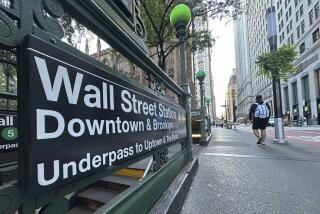Gold’s Price Falls to 12 1/2-Year Low; Dow Rises 84
- Share via
The best-known precious metal continues to look less so to many investors, as they pushed gold’s price down Friday to 12 1/2-year lows on fresh worries about a global supply glut.
Meanwhile, U.S. stocks rallied briskly, as Wall Street appeared to set aside concerns about potential global deflation and instead celebrated another benign inflation report.
The Dow industrials gained 84.72 points, or 1.1%, to 7,572.48, erasing nearly all of a midweek dive and leaving the index just 8.84 points below its level a week earlier.
In the broad market, winners topped losers by nearly 2 to 1 on the New York Stock Exchange in active trading. The Nasdaq composite leaped 1.7% to 1,583.51, though for the week it was off 1.2%.
The drop in gold prices, to just above $300 an ounce, followed confirmation from Germany’s Bundesbank that it has been lending some of its 3,700 metric tons of gold reserves in the open market.
Lending by the Bundesbank and other central banks may be a prelude to outright sales, said Urs Frei, trader at Credit Agricole Indosuez. “Trying to get more money out of their gold in this way could be the first step to selling it one day.”
Other world central banks, including those in Australia and the Netherlands, have dumped gold this year. The Swiss recently said they plan major sales.
On New York’s Comex, near-term futures slumped $4.50 to $303.70 an ounce, the lowest since March 1985.
But silver didn’t fall as much in percentage terms: Near-term futures lost 5.4 cents to $5.07. In fact, silver prices have surged in recent months on the belief that global stockpiles are dwindling.
Gold, the classic inflation hedge, also may have been hurt by another sign that inflation remains dormant in the United States: The government said wholesale prices inched up just 0.1% in October.
Benign inflation has allowed long-term bond yields to decline this year, and although yields closed mostly flat on Friday, they are hovering near 21-month lows. The 30-year Treasury bond yield ended Friday at 6.10%, up from 6.09% on Thursday but down from 6.20% a week ago.
The stock market, which in recent weeks has been obsessed with fears of an economic meltdown in Asia, chose to view the wholesale inflation report as a positive.
But analysts say investors still are spooked by the possibility of global deflation in 1998, because of Asia’s deep economic woes.
On Friday, the Clinton administration dispatched its point man to consult with finance officials in Europe and Asia. Deputy Treasury Secretary Lawrence Summers will meet with European monetary authorities in Frankfurt today and officials of the Japanese government in Tokyo on Monday.
A Treasury official said the financial troubles abroad will be a central agenda item when President Clinton and the leaders of Japan, China and the other countries in the 18-nation Asia-Pacific Economic Cooperation forum meet in Vancouver on Nov. 24-25.
It helped Wall Street on Friday that some key foreign markets turned higher after another drubbing early in the week. Hong Kong’s key index jumped 2.4% to 9,957.33. In Brazil, the Bovespa stock index surged 8.2% to 8,732, though for the week it was off 1.1% on fears that Asia’s economic slowdown will spread to Latin America.
Wall Street’s advance was particularly encouraging, analysts said, because it came before a weekend full of question marks about the latest U.S.-Iraqi standoff and the unfolding financial crises around the world.
Among Friday’s highlights:
* Drug stocks led the rebound, with Lilly up $3.25 to $66.88, Merck up $2.38 to $90.31 and Johnson & Johnson up $2.69 to $62.38.
* Other blue-chip winners included IBM, up $2.38 to $101.50, and Disney, up $2 to $86.69.
* Energy-related stocks also were big winners. Chevron rose $1.94 to $83.94, Atlantic Richfield gained $2.38 to $79.50 and Halliburton was up $3.75 to $57.25. The stocks may have been helped by higher oil prices.
* Bank stocks were mixed, with some major ones falling on continued nervousness over exposure to Asian markets. Chase Manhattan fell $3.63 to $103.63 and Citicorp lost $2 to $116.25.
Market Roundup, D4
More to Read
Inside the business of entertainment
The Wide Shot brings you news, analysis and insights on everything from streaming wars to production — and what it all means for the future.
You may occasionally receive promotional content from the Los Angeles Times.










